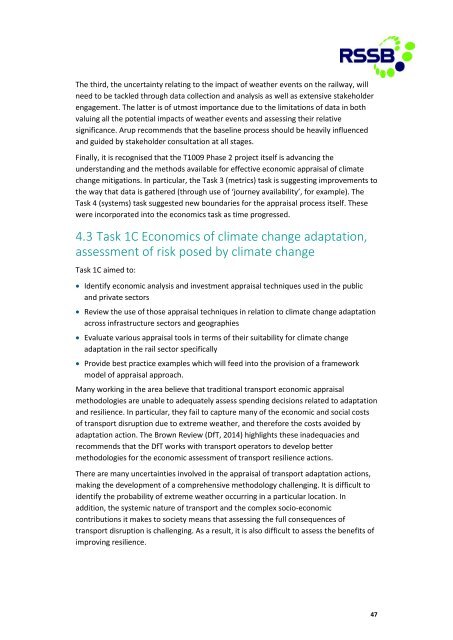Tomorrow's Railway and Climate Change Adaptation Final Report
2016-05-T1009-final-report
2016-05-T1009-final-report
Create successful ePaper yourself
Turn your PDF publications into a flip-book with our unique Google optimized e-Paper software.
The third, the uncertainty relating to the impact of weather events on the railway, will<br />
need to be tackled through data collection <strong>and</strong> analysis as well as extensive stakeholder<br />
engagement. The latter is of utmost importance due to the limitations of data in both<br />
valuing all the potential impacts of weather events <strong>and</strong> assessing their relative<br />
significance. Arup recommends that the baseline process should be heavily influenced<br />
<strong>and</strong> guided by stakeholder consultation at all stages.<br />
<strong>Final</strong>ly, it is recognised that the T1009 Phase 2 project itself is advancing the<br />
underst<strong>and</strong>ing <strong>and</strong> the methods available for effective economic appraisal of climate<br />
change mitigations. In particular, the Task 3 (metrics) task is suggesting improvements to<br />
the way that data is gathered (through use of ‘journey availability’, for example). The<br />
Task 4 (systems) task suggested new boundaries for the appraisal process itself. These<br />
were incorporated into the economics task as time progressed.<br />
4.3 Task 1C Economics of climate change adaptation,<br />
assessment of risk posed by climate change<br />
Task 1C aimed to:<br />
• Identify economic analysis <strong>and</strong> investment appraisal techniques used in the public<br />
<strong>and</strong> private sectors<br />
• Review the use of those appraisal techniques in relation to climate change adaptation<br />
across infrastructure sectors <strong>and</strong> geographies<br />
• Evaluate various appraisal tools in terms of their suitability for climate change<br />
adaptation in the rail sector specifically<br />
• Provide best practice examples which will feed into the provision of a framework<br />
model of appraisal approach.<br />
Many working in the area believe that traditional transport economic appraisal<br />
methodologies are unable to adequately assess spending decisions related to adaptation<br />
<strong>and</strong> resilience. In particular, they fail to capture many of the economic <strong>and</strong> social costs<br />
of transport disruption due to extreme weather, <strong>and</strong> therefore the costs avoided by<br />
adaptation action. The Brown Review (DfT, 2014) highlights these inadequacies <strong>and</strong><br />
recommends that the DfT works with transport operators to develop better<br />
methodologies for the economic assessment of transport resilience actions.<br />
There are many uncertainties involved in the appraisal of transport adaptation actions,<br />
making the development of a comprehensive methodology challenging. It is difficult to<br />
identify the probability of extreme weather occurring in a particular location. In<br />
addition, the systemic nature of transport <strong>and</strong> the complex socio-economic<br />
contributions it makes to society means that assessing the full consequences of<br />
transport disruption is challenging. As a result, it is also difficult to assess the benefits of<br />
improving resilience.<br />
47


